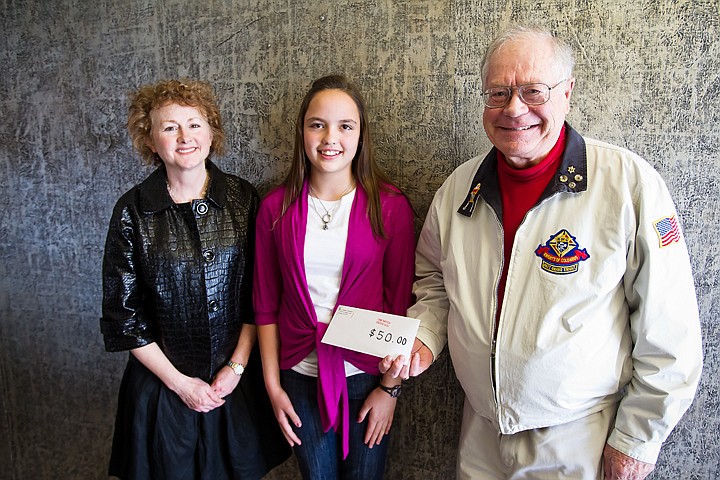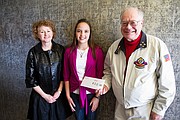Charter students take 2nd, 3rd in writing contest
Editor's note: The first-place entry in this year's Patriotic Essay Contest appears on today's front page.
Second place
Winner: Taylor Garn
Grade: 8th
Teacher: Chris Baker
School: Charter Academy
Family History
Facing unforgiving rivers, intense temperatures, mysterious woods, sense boggling mountains, and strange, new creatures, not to mention hostile Native Americans, and old enemies - death and starvation, those on the Lewis and Clark Expedition were tough people. Their determination to complete the task set before them has provided me with a rich family history that will serve as a legacy for generations to come.
Lewis and Clark painstakingly recorded every step taken and every animal encountered. Thanks to the thorough maps and information they brought back to the East, my ancestors were able to move out West. There they established cities and homes free of prosecution, where one could teach their family all that one believes to be absolutely true. Although my ancestors encountered many hardships, a great deal more would have transpired had there been no Expedition. Reports brought back helped my ancestors prepare for the journey ahead of them. Maps allowed them to spread out farther from their original place of colonization.
Sacagawea played an important role in the Lewis and Clark Expedition, acting as a guide, the entire time carrying a baby on her back. My grandparents had the opportunity to teach two descendants of this strong and courageous woman. At this time of teaching, my grandfather was principal and grandmother taught physical education. One student's name was Rob Arrow White, and the other Rosanne George. Upon remembering the two students, Grandmother and Grandfather remark, "There was something about them that made them hard to forget."
Instead of going down the "River of No Return" or the Salmon River, the Expedition team traveled down a stream that they named Tower Creek. Memories flood my mind when I think of this little stream, for along a small portion of it presently sits a simple cabin that belongs to my grandparents. Providing fun and games, one can spend time well along the banks, and like Lewis and Clark, though not near as far, many a time the waters have carried me down its meandering course. Although quite small at some spots, Tower Creek has surprisingly good fishing and has supplied the main course of a large number of meals that I willingly devour at a moment's notice.
My extended family also lives in an area that Sacagawea found the family she had not seen for many years, finding them when the Expedition stumbled across Shoshone villages. This area is currently named Salmon, Idaho. Along with helping the Expedition by supplying horses and food among other things, they brought joy to Sacagawea. Producing amazing stories that are told to all who will listen to them, this encounter with the Shoshone gave a topic for family discussions over our traditional reunion weekend.
Story after story will be told, but many will not take the time to ponder them, that is until the tales gain personal meaning. Now equipped with people that still walk the earth, Lewis and Clark Expedition stories will bring family into the picture for generation after generation.
Third place
Winner: Emma McCormick
Grade: 7th
Teacher: Lynda LeBlanc
School: Charter Academy
Exploration for the Generations
One town that Lewis and Clark traveled through is present day Three Forks, Montana, where the Madison, Jefferson, and Gallatin Rivers merge. The three rivers of this area gave it its name and Three Forks became a great place for people to settle. In fact, this is where my great- grandparents chose to settle. My great-grandma owned and operated the Sacagawea Inn as a hotel and boarding house for many years. Due to Lewis and Clark's expedition, the past generations of my family were able to settle in the West, including my own family moving to Coeur d'Alene, Idaho. Because of the Lewis and Clark expedition I am able to be living here today.
Thomas Jefferson, the president at the time, needed someone to explore the newly purchased Louisiana Purchase. The Louisiana Purchase covered a territory of 800,000 square miles. President Jefferson asked his personal secretary, Meriwether Lewis, to lead the expedition. Lewis asked his friend William Clark if he would like to become a captain as well. Lewis and Clark set off on a history-making journey in 1804 where they would eventually come across three rivers where my ancestors would follow in their foot paths to settle in the West.
The Corps of Discovery traveled nearly 8,000 miles of what they anticipated to be unexplored territory. Then they met about fifty different Native American tribes. Lewis and Clark were the first white men to identify many western plants, animals, and physical features. Traveling on horseback and by boat the expedition traversed across land that would eventually develop into eleven different states and the land that my ancestors would go over as they made their move to the west.
One very important Native American that took part in the expedition was a Shoshone woman, Sacagawea. She was the wife of Toussaint Charbonneau and the interpreter for the journey. Not only did Sacagawea allow the Corps of Discovery to communicate with other Native American tribes, she was a sign of peace, because a war party would not travel with a woman. My great-grandmother appreciated what Sacagawea had done, and therefore named her hotel after her.
Without the Lewis and Clark expedition, where would we be today? We would be cramped in the East, although we would have eventually ventured across the line. Because of Lewis and Clark, my ancestors settled in the West. My great-grandma owned a hotel in a town that exists because of Lewis and Clark's expedition and interpreter. The state I live in wouldn't have come to be without their assistance. Thanks to Lewis and Clark's expedition I am able to live the life I have in Coeur d'Alene, Idaho.



